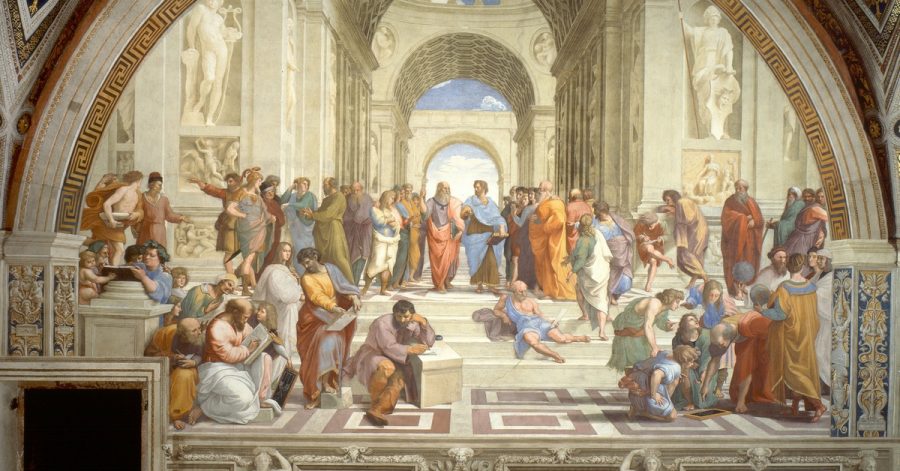Western philosophy provides the means for an outlook on life
Athens, 2400 years ago. It’s a compact place: around 250,000 people live here. There are fine baths, theatres, temples, shopping arcades and gymnasiums. Art is flourishing, and science too. You can pick up excellent fish down at the harbour in Piraeus. It’s warm for more than half the year. This is also home to the world’s first true and possibly greatest philosopher, Plato; The founder of the Academy in Athens, the first institution of higher learning in the Western world. He is widely considered the pivotal figure in the development of Western philosophy. He was was born in 428-7 B.C.E and died at the age of eighty or eighty-one at 348-7 B.C.E. He is often confused with socrates but he is interily a different person. Plato was a student and follower of Socrates until 399 when Socrates was condemned to death for “corrupting the youth” he then drank the prescribed cup of hemlock. It is through Plato that we are familiar with Socrates’ philosophy because he wrote dialogues in which his teacher took part, usually asking leading questions the Socratic method. Wich became critical to philosophy.
The Socratic method is is a form of cooperative argumentative dialogue between individuals, based on asking and answering questions to stimulate critical thinking and to draw out ideas and underlying presuppositions. The socratic method has been used by practically every philosopher to achieve the goal of attaining knowledge, this is why Plato is seen as the father of philosophy because he exposed this method.
Traditionally, there are five main branches of philosophy. They are,
Metaphysics, which deals with the fundamental questions of reality. Epistemology, which deals with our concept of knowledge, how we learn an what we can know. Logic, which studies the rules of valid reasoning and argumentation. Ethics, or moral philosophy, which is concerned with human values and how individuals should act. And Aesthetics which deals with the notion of beauty and the philosophy of art
Lets start with Metaphysics, metaphysics is the foundation of philosophy: Aristotle calls it “first philosophy”. It sks questions like: “What is the nature of reality?”, “How does the world exist, and what is its origin or source of creation?”, “Does the world exist outside the mind?”, “How can the mind affect the body?”, “If things exist, what is their objective nature?”, “Is there a God (or many gods, or no god at all)?” . Aristotle originally split his metaphysics into three main sections and these remain the main branches of metaphysics: Ontology wich is the study of being and existence, Natural Theology the study of God, including the nature of religion and the world, existence of the divine, questions about the creation, and the various other religious or spiritual issues. Universal Science, the study of first principles of logic and reasoning,. Metaphysics has been attacked, at different times in history, as being overly vague, particularly by David Hume, Immanuel Kant and A.J. Ayer. It may be more useful to say that a metaphysical statement usually implies an idea about the world or the universe, which may seem reasonable but is ultimately not empirically verifiable, testable or provable.
Epistemology is the study of knowledge and justified belief. It analyzes the nature of knowledge and how it relates to similar notions such as truth, belief and justification. It also deals with the means of production of knowledge, as well as skepticism about different knowledge claims. Epistemology asks questions like: “What is knowledge?”, “How is knowledge acquired?”, “What do people know?”, “What is its structure, and what are its limits?”, “What makes justified beliefs justified?”, “How we are to understand the concept of justification?”, “Is justification internal or external to one’s own mind?” The kind of knowledge usually discussed in Epistemology is propositional knowledge, “knowledge-that” as opposed to “knowledge-how” for example, the knowledge that “2 + 2 = 4”, as opposed to the knowledge of how to go about adding two numbers. Some of the most Famous practitioners of epistemolgy are . William Alston. Elizabeth Anscombe. Thomas Aquinas. Aristotle. Robert Audi.A. J. Ayer. Francis Bacon. Thomas Bayes.
Logical Philosophy comes next. Logic comes from the Greek “logos”, which has a variety of meanings including word, thought, idea, argument, account, reason or principle. It is the study of reasoning, or the study of the principles of valid inference and demonstration. It attempts to distinguish good reasoning from bad reasoning. Logic investigates and classifies the structure of statements and arguments, both through the study of formal systems of inference and through the study of arguments in natural language. There are three necessary things that must be there in logic. Number 1 Consistency : the theorems do not contradicts one another. Number 2 Soundness: system’s rule of proof will never allow false inferences from a true premis. Number 3 Completeness: there are no true sentences in the system that cannot, at least in principle, be proved in the system
Ethics, also called moral philosophy, the discipline concerned with what is morally good and bad, right and wrong. The term is also applied to any system or theory of moral values or principles. One branch, meta-ethics, investigates big picture questions such as, “What is morality?” “What is justice?” “Is there truth?” and “How can I justify my beliefs as better than conflicting beliefs held by others?” Another branch of moral philosophy is normative ethics. It answers the question of what we ought to do. Normative ethics focuses on providing a framework for deciding what is right and wrong. Three common frameworks are deontology, utilitarianism, and virtue ethics. It also tackles specific moral challenges that people face daily, such as whether they should lie to help a friend or co-worker.
Aesthetics, also spelled esthetics, the philosophical study of beauty and taste. It is closely related to the philosophy of art, which is concerned with the nature of art and the concepts in terms of which individual works of art are interpreted and evaluated. Aestheticians ask questions like “What is a work of art?”, “What makes a work of art successful?”, “Why do we find certain things beautiful?”, “How can things of very different categories be considered equally beautiful?”, “Is there a connection between art and morality?”, In very general terms, it examines what makes something beautiful, sublime, disgusting, fun, cute, silly, entertaining, pretentious, etc.
By studying philosophy, people can clarify what they believe, and they can be stimulated to think about ultimate questions. A person can study philosophers of the past to discover why they thought as they did and what value their thoughts may have in one’s own life. There are people who simply enjoy reading the great philosophers, especially those who were also great writers. Philosophy has had enormous influence on our everyday lives. The very language we speak uses classifications derived from philosophy. For example, the classifications of noun and verb involve the philosophic idea that there is a difference between things and actions. If we ask what the difference is, we are starting a philosophic inquiry. Every institution of society is based on philosophic ideas, whether that institution is the law, government, religion, the family, marriage, industry, business, or education. Philosophical differences have led to the overthrow of governments, drastic changes in laws, and the transformation of entire economic systems. Such changes have occurred because the people involved held certain beliefs about what is important, true, real, and significant and about how life should be ordered.
|
|
||
























